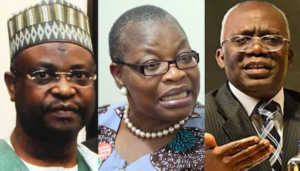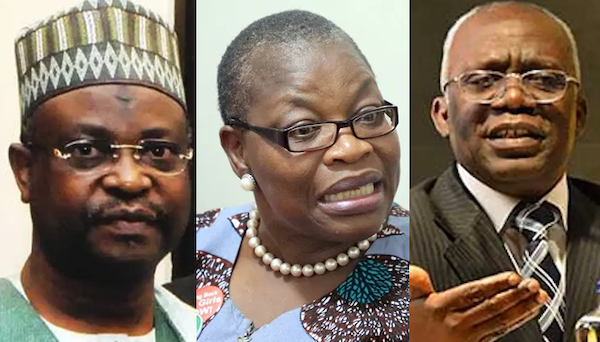
Former Speaker, House of Reps, Ghali Umar Na’Abba; former Education Minister, Obiageli Ezekwesili; senior lawyers, Femi Falana and Olisa Agbakoba; and 26 other activists and professionals are championing a new political movement ahead of the 2023 general election.
The movement called National Consultative Front is aimed at mobilising Nigerians for a popular mass action towards political constitutional reforms that are citizen-driven and process-led in engendering a new peoples ’ constitution.
The group made this known in a communiqué released Wednesday at its new National Secretariat in Abuja following a month-long nationwide consultations and virtual meetings.
NCF also set up a 30-man steering committee that includes Former Speaker of the House of Representatives, Ghali Na’abba ; former Deputy Governor of the Central Bank , Dr. Obadiah Mailafia ; Olisa Agbakoba , SAN ; Femi Falana SAN ; Col . Abubakar Umar ( retd .) , Dr Oby Ezekwesili; Prof Jibo Ibrahim ; Yabagi Sanni ; Amb , Nkoyo Toyo , Isa Aremu, Prof Chidi Odinkalu, and Senator Shehu Sani .
Others include: Prof . Remi Sonaiya , Mallam Tanko Yinusa , Alhaji Shettima Yerima , Lady Funke Awolowo, Peter Ameh and Ogbeni Lanre Banjo, among others.
According to the communique, part of the resolutions reached during the meeting was that, “A new ideological mass Movement shall be initiated to embark on immediate mass mobilisation of the nooks and crannies of the country for popular mass action towards political constitution reforms that is citizens -driven and process-led in engendering a new Peoples ’ Constitution for a new Nigeria that can work for all .
“The new movement shall also , without delay , mobilise for the economic wellbeing and prosperity of all Nigerians by demanding and ensuring that Chapter 2 of the present Constitution i .e . ; “Fundamental Objectives & Directive Principles of State Policy becomes justiciable once and for all , while also mounting an articulate and vigorous campaign to deconstruct and reconstruct obnoxious election laws which have provided leeway for opportunists in the corridor of power to subvert the will of the electorate making voting irrelevant in determining who actually becomes elected in Nigeria .”
The Herald


